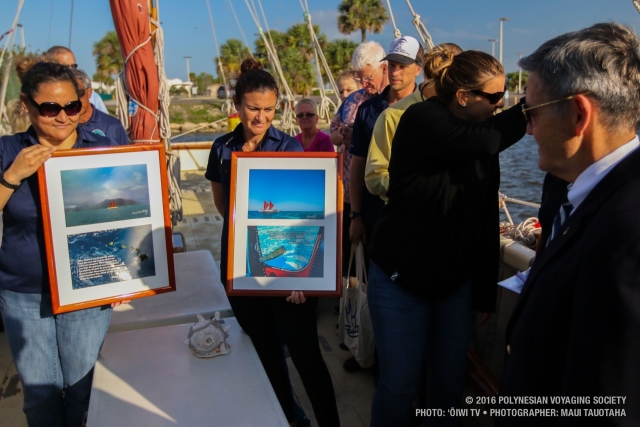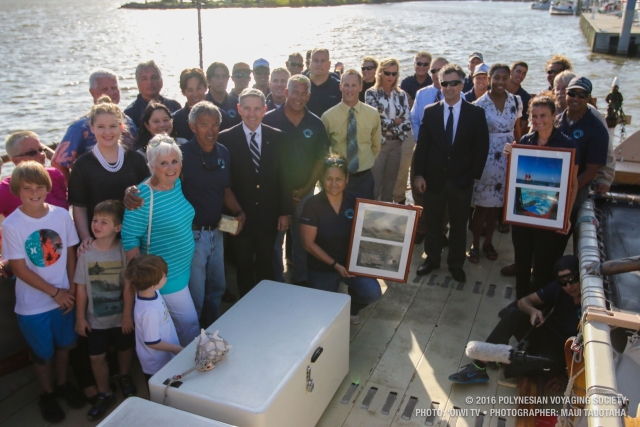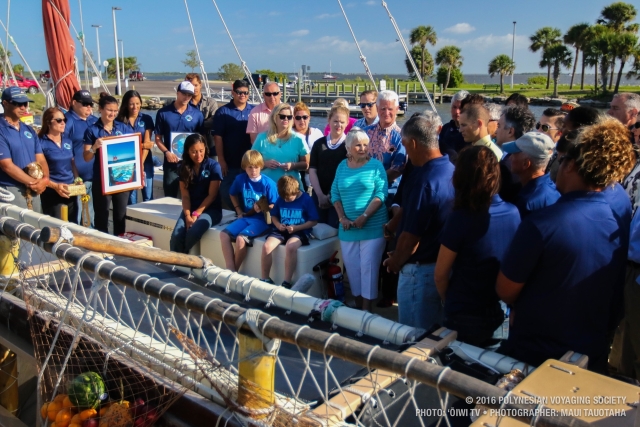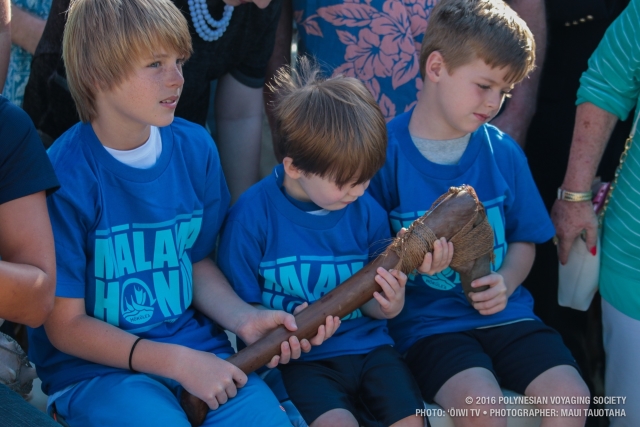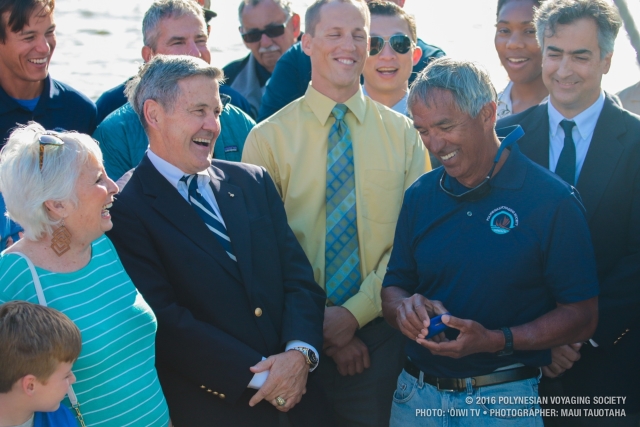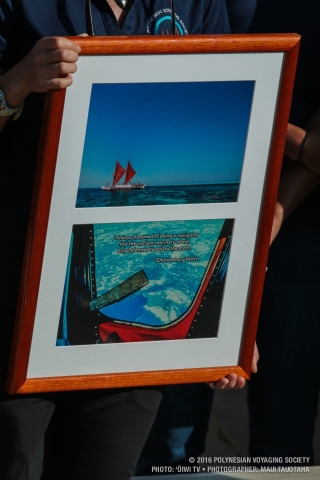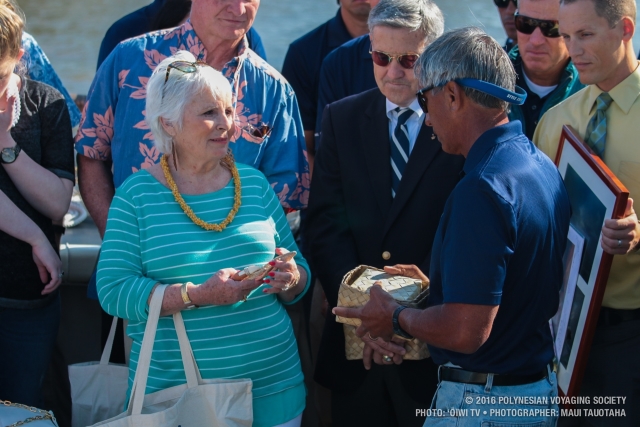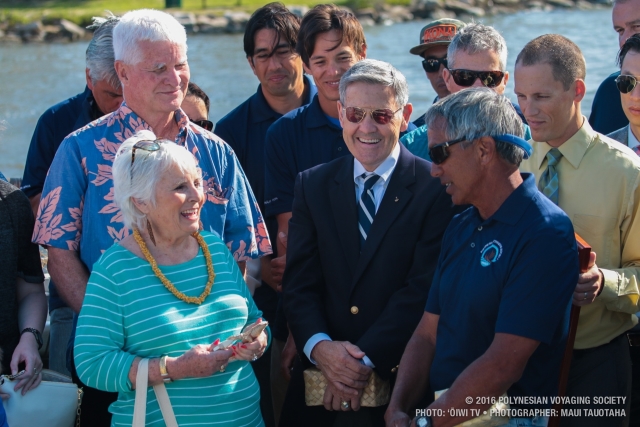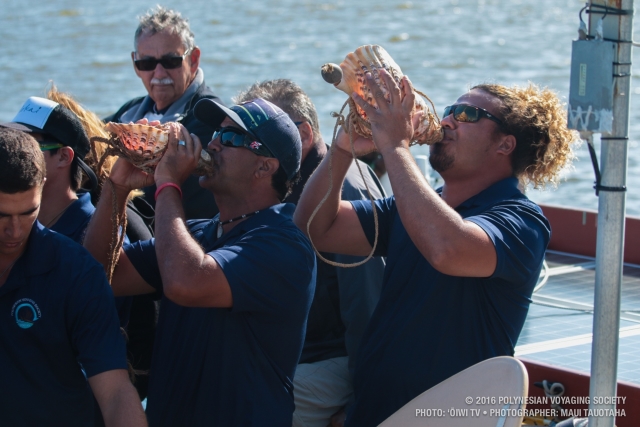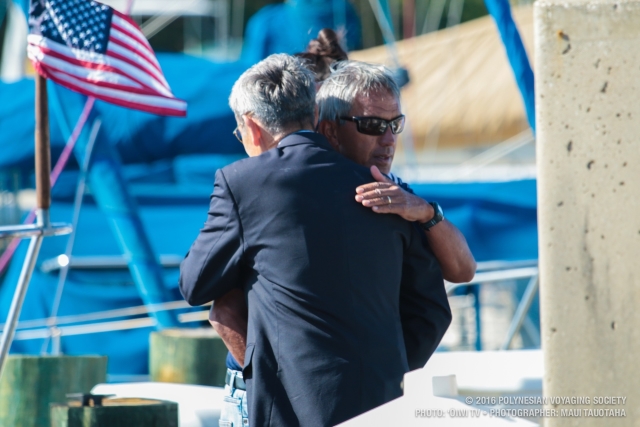
Honoring Hawaiʻi’s Astronauts
- Posted on 6 Apr 2016
- In Education, Featured, Newsletter, Photo Galleries, Teachers, Updates
This morning while Hōkūleʻa is moored at Titusville Municipal Marina about 13 miles away from Kennedy Space Center, Nainoa Thompson, Pwo navigator and president of Polynesian Voyaging Society, and Hōkūleʻa crewmembers held a ceremony on the legendary voyaging canoe to honor the memory and contributions to space exploration made by Hawaii-born NASA astronauts Lacy Veach and Ellison Onizuka.
The ceremony started with the blowing of a conch and chant followed by remarks by NASA representatives and a presentation by Thompson naming Veach as one of the Great Navigators of the World. Members of the Veach family who were in attendance included Lacy’s wife Alice; their daughter Maile, her husband Bill Chatlos and their three children; Leslie Veach, sister-in-law of Lacy; Lacy’s brother Michael and his daughter Victoria Veach.

“It’s a real pleasure for me to be here today and to be on the canoe; having a connection to both Lacy Veach and Ellison Onizuka and seeing them recognized was very special,” said Robert Cabana, director of the NASA John F. Kennedy Space Center. “Meeting Nainoa and knowing his relationship, you know, we’re tied together whether we’re exploring in space or we’re exploring on the ocean. We both see this beautiful blue jewel planet that we live on from a different perspective. But we see the same thing – how fragile it is and how important it is. And as Lacy said, this is our island, and we need to take very good care of it.”

Nainoa shared some wonderful stories of Lacy
Veach was the person who first suggested the idea that Hōkūle‘a should sail around the world to share the message to care for Island Earth. Back in 1992, while orbiting the Earth, Veach spoke via radio from aboard the Space Shuttle Columbia, Mission STS-52, with Thompson who was aboard Hōkūle‘a sailing from Rarotonga to Honolulu. They compared the similarities and differences between Hōkūle‘a and spaceship Columbia.
“Both are voyages of exploration. Hōkūle‘a is in the past, Columbia is in the future,” Veach said.
Aboard the shuttle, Veach had a vision. “Lacy was asleep,” Nainoa recalls, “stuck to the wall with Velcro, when another astronaut woke him up. ‘Come and look out the window. We’re passing over Hawai‘i,’ he said. Veach looked out the porthole of the shuttle. The sight of the islands took his breath away. He saw the islands and the planet in one vision – that Planet Earth was just an island like Hawai‘i, in an ocean of space, and that we needed to take care of them both if the planet was to remain a life-giving home for humanity.”

Aboard the canoe, Thompson had a similar vision: “When we sail, we are surrounded by the world’s large ocean, but Earth itself is also a kind of island, surrounded by an ocean of space. In the end, every single one of us – no matter what our ethnic background or nationality – is native to this planet. As the native community of Earth we should all ensure that the next century is the century of pono – of balance – between all people, all living things and the resources of our planet.”
Veach had seen the damage that human populations were doing to Planet Earth from space – great river deltas spewing pollution into the oceans, fires and plumes of smoke from pristine rain forests, sprawling cities. Veach, Thompson, and his father Pinky Thompson believed that Planet Earth was heading toward an unsustainable future. But they also believed that the knowledge and values of their Hawaiian ancestors had enabled them to care for Hawai‘i and her surrounding ocean for nearly 2,000 years through the careful management of natural resources to sustain a large, healthy population.

Lacy’s moʻopuna holding the koʻi that travels on Hōkūleʻa around the world
“We should go and share that knowledge and those values with the world,” Veach suggested in 1992.
From that conversation emerged the vision of Hōkūle‘a’s “Mālama Honua” voyage – sailing around the world to share Hawaiian values and practices and to learn from others how to live within the budget of nature’s resources.
More than Adventure
Beyond a daring expedition, the Worldwide Voyage is quite possibly the most important mission that Hawaiʻi has ever attempted. As people of Oceania, we are leading a campaign that gives voice to our ocean and planet by highlighting innovative solutions practiced by cultures around the planet.
We could not have begun this great journey without your support, nor can we continue to its completion.


